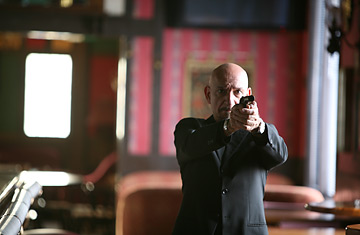
Sir Ben Kingsley plays the hitman Frank in You Kill Me.
Having fortified himself against the cold with a few big gulps from his booze bottle Frank Falenczyk (Ben Kingsley) emerges into the winter wonderland of Buffalo, N.Y., to shovel the snow from his walk. His motivational method is simple: he tosses the bottle into a drift a few feet ahead of him, clears the white stuff from the path until he reaches his vodka, takes another bracing slug of the stuff, tosses the bottle ahead of him again and repeats his ritual. Eventually he will be fully bombed and his walk will be fully cleared. Unless, of course, hypothermia gets him first.
Frank, obviously, has a drinking problem. And it is interfering with his job performance. Indeed, he sleeps straight through his next assignment. Since he's a hit man for a fading mob, that is not exactly a good career move. His boss (Philip Baker Hall) orders him to San Francisco to dry out. On the face of it, this is not a good idea; Frank is not what you'd call a logical candidate for AA pieties. He's perhaps a better fit for the job that's found for him in a funeral parlor; dead bodies are no big deal for Frank.
You Kill Me is no big deal of a movie either. It's small scale, low budget and not straining for big yuks. On the other hand, it's an unprepossessing delight, especially after Frank meets Laurel (Tea Leoni). She's a salty talker and he's drawn to her by her less than grief-stricken remarks about her stepfather, as Frank prepares his body for his last rites. You may wonder what a bright, pretty young woman would see in an aging, taciturn mobster, but, hey, this is a romantic comedy of a sorts and stranger things than that have happened over the years in that genre. I mean, by what logic did Cary Grant and Katherine Hepburn find themselves keeping company with a leopard in rural Connecticut?
Probably what draws Frank and Laurel together is their mutual capacity for truth telling, which may also explain why Laurel doesn't have a boy friend. Most guys don't much like women who lack the winsome gene. That's not a problem for Frank, and the course of their love and his rehabilitation runs relatively smoothly. This is in contradistinction to life in the Krzeminski mob back in Buffalo. They are being decimated by the rival O'Leary gang, whose sneering, sadistic leader (Dennis Farina) is in no mood to take prisoners. A sober Frank's odds-balancing presence is now required, and — guess what? — Frank is going to require a little help from Laurel to get all the circles squared.
What's most deeply pleasurable about You Kill Me is its unique tone. The script by Christopher Marker and Stephen McFeely (who number the rather different Chronicles of Narnia among their credits) is not one that goes for big laughs. It offers, instead, a steady mutter of eccentric situations and, better still, a whole bunch of glum and occasionally desperate characters whose depressive natures are hinted at but never boringly explicated. They appear and disappear rather casually in the story, which the director John Dahl (Red Rock West, The Last Seduction) paces expertly. His film moves not with the speed of light, but the speed of life — a little bit hesitantly, a little bit digressively. He's not ramrodding us into submission, not force-feeding us a lot of big melodramatic scenes. Stuff keeps happening in this movie — some of it fairly bloody — but always within the context of its own ideas of carefully-controlled, if very peculiar, sense of normalcy.
That's the way the best comedies always operate — without for a minute conveying the sense that their makers are aware of how funny they are being. They let us discover their weirdness in our own good time. I don't want to oversell You Kill Me. It is not going to leave you breathless with laughter. But I don't want to undersell it either. For an hour and a half it exerts its own preposterous reality, making you believe it — and like it.
